Posts Tagged ‘Burma Partnership’ (399 found)
Burma/Myanmar Not Ready for Rights-Compliant Investment
The current legal, political, and economic context in Burma/Myanmar does not enable foreign investment that complies with key international norms and standards. This is the finding of an informal visit to Burma/Myanmar carried out by the International Federation for Human Rights (FIDH) along with […]
• • •Civil Society Calls on UN Human Rights Council to Address Serious Human Rights Challenges in Burma/Myanmar
Civil society organizations from Burma/Myanmar are urging the United Nations Human Rights Council 22nd session to address the serious human rights violations that are challenging the country’s reform process. Today, 22 organizations released a statement […]
• • •Burma’s Ethnic Areas Too Volatile for Foreign Investment
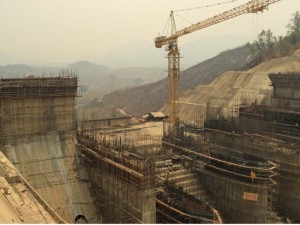 In the same week that China announced that the Shwe oil and gas pipeline that runs across Burma will be completed in May, a report from the Transnational Institute and Burma Centre Netherlands, Developing Disparity: Regional Investment in Burma’s Borderlands, warns that foreign investment in ethnic areas has the potential to exacerbate ethnic tensions and disempower local communities.
In the same week that China announced that the Shwe oil and gas pipeline that runs across Burma will be completed in May, a report from the Transnational Institute and Burma Centre Netherlands, Developing Disparity: Regional Investment in Burma’s Borderlands, warns that foreign investment in ethnic areas has the potential to exacerbate ethnic tensions and disempower local communities.
The completion of the 700-mile Shwe dual oil and gas pipeline will conclude the opening chapter of a project that has created a platform for a plethora of human rights abuses. Transporting oil and gas from the Bay of Bengal, the pipeline starts in Arakan State, and passes through Magway and Mandalay Divisions and Shan State, before finishing in Yunnan province, China. While the military controlled company, the Myanmar Oil and Gas Enterprise will gain up to $29 billion over the next 30 years through sale of oil and gas to China, the project has already negatively affected communities across Burma, as the Ta’ang Students and Youth Organization recently documented in Ta’ang areas of Shan State […]
Commemoration Calls Attention to Political Prisoners’ Struggle
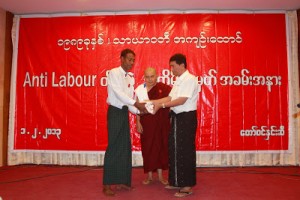 On 1 February, a group of former political prisoners held a public forum in Rangoon to commemorate their protest against forced prison labor in Tharawaddy Prison in 1989. The group was arrested and imprisoned after the 1988 popular uprising that was brutally crushed by the military regime. The “Anti-Labor Protest”, as they called it, was an act of resistance to the first time after the 1988 uprising that prison authorities imposed hard labor on political prisoners. It was also the first time after the uprising that prisoners stood up for their rights and the prison authorities’ first use of widespread and brutal torture against them.
On 1 February, a group of former political prisoners held a public forum in Rangoon to commemorate their protest against forced prison labor in Tharawaddy Prison in 1989. The group was arrested and imprisoned after the 1988 popular uprising that was brutally crushed by the military regime. The “Anti-Labor Protest”, as they called it, was an act of resistance to the first time after the 1988 uprising that prison authorities imposed hard labor on political prisoners. It was also the first time after the uprising that prisoners stood up for their rights and the prison authorities’ first use of widespread and brutal torture against them.
On 17 November 1989, 250 political prisoners were transferred from Insein Prison to Tharawaddy Prison in Pegu Division. On 23 November, prison authorities began to force the political prisoners to perform hard labor, but 6 people refused to do so. Authorities separated them into two groups, severely beat each of the prisoners and placed them in solitary confinement. The following day, other political prisoners demanded to see the 6 who had been taken away. When their demand was rejected, they refused to perform hard labor as well. As with the 6 original protesters, they were also sent to solitary confinement and tortured terribly. Three of these protesters died shortly after they were released from prison […]
• • •Aid and Development Plans Undermined by Sustained Military Offensive
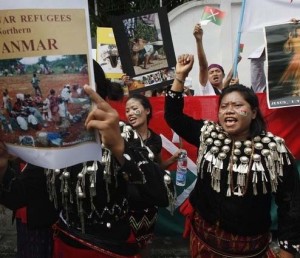 In the week that the Nay Pyi Taw Accord for Effective Development Cooperation was signed between the Burma government and international donors and NGOs outlining the big picture plans for aid and development, the full-blown offensive in Kachin State has reached a crisis point.
In the week that the Nay Pyi Taw Accord for Effective Development Cooperation was signed between the Burma government and international donors and NGOs outlining the big picture plans for aid and development, the full-blown offensive in Kachin State has reached a crisis point.
The document, as expected, is teeming with the current language and concepts of the development industry. Participatory approaches when engaging with civil society, increasing the transparency and effectiveness of government initiatives, pro-poor strategies, and accountability are all mentioned. Statements and announcements made by the government usually sound a lot better than how they are actually implemented. The promised joint review board for political prisoners has not yet materialised, various commissions set up to investigate acts of violence in Arakan State, the crackdown on peaceful protesters at Letpadaung copper mine, and nationwide land confiscations have not produced any tangible, progressive results. A few days after the signing of the accord, the World Bank and the Asian Development Bank announced new loans to the Burma government, totalling around US$950 million. Annette Dixon, the World Bank’s Country Director for Burma praised the “unprecedented reforms to improve people’s lives, especially the poor and vulnerable.”
These discussions of progress, lofty ideals, and fashionable development concepts between the central government and international agencies in the expansive new capital of Naypyidaw are in stark contrast with the plight of Kachin people in the far north of the country. The Burma Army is continuing its advance toward the town of Laiza, the last outpost of Kachin Independence Army (KIA) controlled territory, as more and more civilians suffer from the ongoing assault in their homeland. It was reported that on Saturday a strategic mountain post was taken after a sustained, heavy Burma Army assault, and many fear that it is only a matter of time before Laiza is taken. Already, around half of its population has fled […]
Burma Continues to Repress Critical Voices
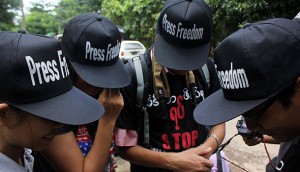 According to Freedom House’s annual global survey on political rights and civil liberties released this week, Burma is still rated as “Not Free.” A “Not Free” country is one where basic political rights are absent, and basic civil liberties are widely and systematically denied.
According to Freedom House’s annual global survey on political rights and civil liberties released this week, Burma is still rated as “Not Free.” A “Not Free” country is one where basic political rights are absent, and basic civil liberties are widely and systematically denied.
This could come as a surprise after the reforms that President Thein Sein and his government have started implementing but as Freedom House explains freedoms of expression and association improved in the last two years “but they depend more on current government policy than on deep institutional changes.”
One of the noticeable areas of reform is freedom of information. Thein Sein released bloggers and journalists, ended pre-publication censorship, and authorized the publication of privately-owned dailies. Regrettably, as explained in a report released this week by Reporters Without Borders, “as things stand, the possibility of the reforms being perverted cannot be ruled out.” The Press Scrutiny and Registration Division is still in place and can suspend any weekly that publishes “forbidden” content, there is no law providing protection to media and journalists, the old oppressive laws remain unamended and privately owned weeklies have been facing legal proceedings […]
Burma Must End Offensives and Dialogue with Ethnic Armed Groups for a National Political Settlement
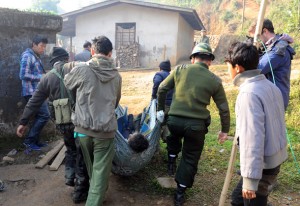 We have entered a new year after a year and a half of fighting between the Burma Army and the Kachin Independence Army (KIA). Since the war started, it is estimated that up to 100,000 people have been displaced. These refugees are living in Burma’s coldest area and receive very little humanitarian assistance as aid workers, including those from the United Nations, are often denied access to them.
We have entered a new year after a year and a half of fighting between the Burma Army and the Kachin Independence Army (KIA). Since the war started, it is estimated that up to 100,000 people have been displaced. These refugees are living in Burma’s coldest area and receive very little humanitarian assistance as aid workers, including those from the United Nations, are often denied access to them.
The intensity of war against the KIA has reached a crisis point after the Burma Army launched a series of air strikes in late December. After exposure of footage on the internet of the air strikes the government had no choice but to admit the use of military jets and attack helicopters in carrying out targeted attacks. Today, the Burma Army injured and killed civilians in its attack on Laiza, the KIA headquarters. Yet the government still insists that it is not launching offensives but acting in self-defence. It is now unthinkable how far the Burma Army might go to win this war […]
Will Myanmar’s War Refugees be Forced Home Against their Will?
They can’t live like this forever. Many of the 160,000 refugees evading conflict in eastern Myanmar inhabit a purgatory of thatch-roofed shanties across the river border in Thailand. Life in the United Nations-monitored camps is dreary and monotonous […]
• •A Year of Nascent Reforms to Build Upon
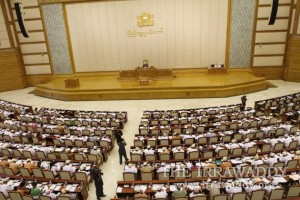 2012 has been an eventful year for Burma – a year of initial steps hopefully in the right direction as well as several hurdles that pose serious challenges to the reform process.
2012 has been an eventful year for Burma – a year of initial steps hopefully in the right direction as well as several hurdles that pose serious challenges to the reform process.
In April, Daw Aung San Suu Kyi and 42 other members of the National League for Democracy won their parliamentary seats in a landslide victory for the party. However, parliamentary procedures are obscure and NLD and other progressive MPs are outnumbered by those from the Union Solidarity and Development Party and the military, making it difficult to raise important issues, repeal oppressive laws or push for amendments to draft legislations.
This year, we have seen the release of a significant number of political prisoners. While the freedom of these crucial players in the democratic process was welcomed, the opportunistic nature of the releases and the existing charges against those released cast a dark shadow. Hundreds of political prisoners remain in jail and authorities continue to arrest outspoken activists, including most recently those who have protested against the Letpadaung copper mine, one of many cases of land confiscation throughout the country […]
Protest and Persecution Under the Guise of Reformist Laws
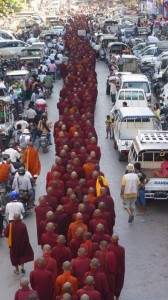 Last week saw protests spread across Burma against the deplorable treatment by the authorities against those who dared to oppose the Letpadaung copper mine. The reaction of the government was all too familiar, with more monks arrested for their participation in peaceful demonstrations.
Last week saw protests spread across Burma against the deplorable treatment by the authorities against those who dared to oppose the Letpadaung copper mine. The reaction of the government was all too familiar, with more monks arrested for their participation in peaceful demonstrations.
The incident at the Letpadaung copper mine near Monywa, Sagaing Region, saw riot police brutally break up an 11-day protest by activists and monks against the mine that is forcing people off their land and causing major environmental damage. The police stormed the protest camp in the middle of the night, used tear gas and incendiary devices to break up the rally and injured at least 65 monks, while arrests of activists were made in Rangoon.
Since the crackdown, in scenes reminiscent of the 2007 Saffron Revolution, thousands of monks marched peacefully down main streets of Rangoon, Mandalay, Myingyan, Monywa and other towns and cities. They demanded an apology for the violence from President Thein Sein, the unconditional release of those arrested, and legal action against the perpetrators of the violence. Their courage in the context of the threat of serious violence is typified by Abbot Thawbita, one of the monks demonstrating in Mandalay, who said, “We believe that if we accept this violence now, we will have to face more serious suppression.” Union Minister Hla Tun has apologized to some of the injured monks in a ceremony in Mandalay on 15 December, but this falls short of the monks’ demand that the President himself apologize. Meanwhile, those protesters arrested in Rangoon on 26 November and 2 December have been released on bail,but still face charges of inciting public unrest […]









 All posts
All posts